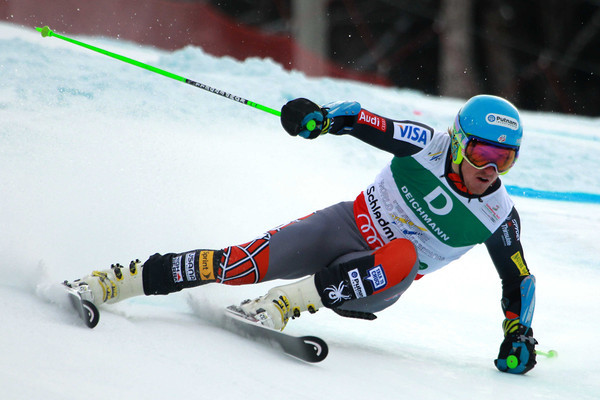LAUSANNE, Switzerland -- Two years ago, Rio de Janeiro's bid team came here and put up a map that showed the Summer Games had never been to South America, a remarkably clever piece of stagecraft that separated Rio from four other contenders and, ultimately, made the case for its stunning win for the 2016 Summer Games.
The three cities for the 2018 Winter Games came here Wednesday with movies and charts and Olympic medalists by the score, the two perceived chasers, Munich and Annecy, France, looking for a similar breakout moment to make up ground against the favorite, Pyeongchang, South Korea.
The Koreans came Wednesday with the admittedly "nervous" but nonetheless impressive Yuna Kim, the women's 2010 figure skating gold medalist. And they have their own world map.
That map shows that the Winter Games have been held in Asia only twice, and both times in Japan, in Nagano in 1998 and Sapporo in 1972.
This is the underlying dynamic of this 2018 race, and unless the others wield a compelling argument to the contrary, it's why this arguably is -- and always has been -- the Koreans' race to lose. The IOC will vote July 6 by secret ballot in Durban, South Africa.
The essential 2018 question is whether the forces of history, economics and demographics are -- or are not -- on Korea's side.
To frame it another way: Is the sports world still in the expansionist mode of recent years? Or is 2018 the campaign in which the IOC takes a break and opts for a more traditional locale before venturing forth anew in 2020, 2022 and beyond?
To be clear: The Koreans have a lot going for them. Then again, if they could win, of course they could lose. They have bid twice before for the Winter Games, for 2014 and 2010, and lost both times. Moreover, it's an International Olympic Committee election; by definition, the only thing predictable about an IOC campaign is that it's unpredictable.
Indeed, sometimes it's just flat-out unusual.
One such moment:
At the session Wednesday, held at the Olympic Museum, and formally dubbed a "technical briefing," with each city given a 45-minute presentation window followed by a question-and-answer session, Hicham el Guerrouj, the great Moroccan middle-distance runner who since 2004 has been an IOC member, posed a question during Annecy's time about the arrest in New York on sexual assault charges of French financier Dominique Strauss-Kahn.
IOC president Jacques Rogge promptly ruled the question out of order.
Rogge was not asked about that question at an end-of-the day news conference.
He declared the day a big success: "It was a very good day for the International Olympic Committee because whoever wins will definitely be able to stage very good Games."
He also said, and perhaps he's absolutely right about this, perhaps he's just practicing diplomacy: "It's going to be a close race."
The Koreans, with their tagline about taking the Games to "new horizons," would appear in many regards to be driving the campaign. At the least, the other two bids have felt compelled to respond to the Korean narrative.
"When you choose the Olympic host city, it is about more than just geography," Katarina Witt, the chair of the Munich bid, stunning as ever in a low-cut dress by the Berlin designer Michalsky, told the 88 IOC members on hand, stressing that Munich would deliver full stadiums and "the single greatest experience" of each athlete's life.
It's not just about geography, of course.
Even so, the broad theme of the era in which we are living is writ large.
The nations that through the 1990s played host to major sports events have been giving way in recent years to countries and regions that, logically enough, are saying, it's our turn now.
As a for instance, this is why -- despite what is shaping up to be a comparatively weak field for 2020 -- the U.S. Olympic Committee, even if its revenue and marketing issues with the IOC are resolved, ought to give serious, serious pause before considering an entry.
One theory holds that after ranging afield to new locales -- such as Rio for 2016 -- the IOC needs to park in a safe harbor, such as the U.S., for 2020.
Applying that theory now would deliver 2018 to Germany or France -- after 2014 in Sochi, Russia, where they're building a brand-new Winter Games destination from scratch.
The competing theory is that the Olympic and international sports world is still very much in the midst of turning away from what was and toward what's next.
See, for example: Russia 2014; Brazil 2016 (and soccer's World Cup in 2014.)
Russia, again, for the World Cup in 2018. Qatar, for the World Cup in 2022.
Qatar, again, for the men's team handball world championship in 2015 -- chosen this past January over three European bids, from France, Norway and Poland.
Our world is changing all around us. Just a couple days ago, in an event that went virtually unnoticed in the United States but is big stuff in Europe, with more than 100 million people tuned in to watch the final episode, Azerbaijan, one of the former Soviet republics, won the Eurovision song contest.
Germany was 10th; Britain, 11th. Spain and France finished farther still down the list.
Azerbaijan winning Eurovision -- that underscores a major cultural and economic shift.
Here's another huge economic shift in the making, a point the Koreans have underscored time and again during this 2018 campaign:
By 2030, according to an Asian Development Bank Study, Asia will make up 43 percent of worldwide consumption. From 1990 to 2008, the middle class in Asia grew by 30 percent, and spent an average of an additional $1.7 trillion annually. No other region in the world comes close.
Complicating the 2018 Olympic dynamic, though, is the factor of personality politics.
Thomas Bach, the vice president and presumed IOC presidential candidate in 2013, is leading the Munich bid. He observed Wednesday that "there are cycles of life," a time where "you go to new shores" and another "where you cultivate your foundations."
While the presentations Wednesday were important, the behind-the-scenes politicking now begins in earnest.
"This is a marathon race," Bach said at a news conference. "It's of no importance whether you lead at 22k or 35k or 40k. The only thing that counts is to cross the finish line first, on the 6th of July. After today's presentation and the response, which we can feel, we go into this final stretch of this very special Olympic marathon with full confidence and with all the determination and with all the passion we can have for the Olympic Games in Germany and for winter sports in particular."
Asked where Munich stood at this point in the "marathon," Bach answered, "I don't care. This is, as I said, about winning."
For their part, the French team includes Jean-Claude Killy, the triple 1968 Games ski champion turned sports administrator. Arguably no one within the Olympic movement carries more credibility within winter sports circles. "We think we have nothing to envy the other two propositions," he told reporters after the French had briefed the 88 members.
Later, he said that he supported the bid "very strongly." He also, reading from a paper left over from the German news conference, said, "It says here that 'Munich loves you.' So I just want you to know that we love you, too."
The chairman of the Korean bid, Yang Ho Cho, met reporters immediately after the Pyeongchang presentation ended. In keeping with the Korean message of humility, he said, "The decision is up to the IOC members. We did our best," adding a moment later, "We sent a message of new horizons."
--
A quickie and by no means exhaustive summary of the three bids:
-- Munich: One of the world's great cities. Re-purposed 1972 Summer Games venues. Big crowds. Fantastic guaranteed atmosphere. German business underwrites 50 percent of the revenues of the seven sports on the Winter Games program. Germany hasn't hosted the Winter Games since 1936.
-- Annecy: The IOC has had a penchant for staging recent Winter Games in big cities -- Vancouver, Torino, Salt Lake City. What about the mountains? "Authentic" Annecy, amid the world's most iconic mountain range and with a sustainable development plan in mind, is uniquely positioned to take the Winter Games, and mountain communities worldwide, into a 21st-century future.
-- Pyeongchang: Time is not only ripe but right to go to Asia and South Korea to grow the Winter Games, and in a big way. 87 percent national support for 2018 Games. Major national priority. Two prior bids, spent $1.4 billion to build first-class Alpensia resort in what used to be potato fields. "We are keeping our promises to the IOC," former provincial governor and bid leader Jin Sun Kim stressed at news conference.













